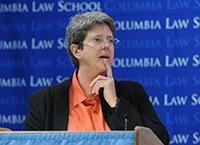New Project on Religious Exemptions and Civil Rights Launches
Katherine Franke, Director of the Center for Gender and Sexuality Law, Creates Public Rights/Private Conscience Project, a New Think-Tank Designed to Reset the Conflict Between Sex Equality, Reproductive Rights, and Religious Liberty
New York, March 24, 2014—Katherine Franke, director of Columbia Law School’s Center for Gender and Sexuality Law, announced today the launch of the Public Rights/Private Conscience project, a new think-tank created to address the increased use of religion-based exemptions from compliance with federal and state laws securing equality and sexual liberty.
The scope of religious exemptions will feature prominently at the U.S. Supreme Court tomorrow, March 25, when owners of the craft store chain Hobby Lobby and furniture manufacturer Conestoga Wood argue that their religious beliefs justify an exemption from the Affordable Care Act’s requirement that employers include contraception coverage in their employee health plans. The cases are Sebelius v. Hobby Lobby Stores, Inc. and Conestoga Wood Specialties Corp. v. Sebelius.
| Professor Katherine Franke |
With increasing frequency, opponents of same-sex marriage, reproductive rights, and gender equality have sought a safe harbor in religion to justify otherwise illegal employment and business practices. Arizona Governor Jan Brewer recently vetoed a bill that critics argued would allow businesses to discriminate against gays and lesbians if the discrimination were attributed to religious beliefs. Similar bills are making their way through other state legislatures.
“With greater and greater frequency, respecting equality rights is seen as optional while respecting religious liberty is mandatory,” Franke said. “The Public Rights/Private Conscience project will bring the considerable academic resources of Columbia University to bear on rethinking this intractable standoff between religious liberty and other rights.”
The Public Rights/Private Conscience project will:
- map the arguments being made in the religious exemptions context in court cases, academic scholarship, policy papers, and the media;
- mobilize scholars, lawyers, and advocates in an effort to reframe the debate so that compliance with civil rights norms is seen as compatible with faith-based doctrines;
- develop model language that can be included in proposed legislation that strikes the constitutionally required balance between religious liberty and other fundamental constitutional rights; and
- develop best practices to address entities or individuals that refuse service on the basis of religion.
The project will be directed by Kara Loewentheil, currently a postdoctoral associate-in-law and fellow in the Program for the Study of Reproductive Justice at the Information Society Project at Yale Law School. Loewentheil previously served as a Blackmun Legal Fellow at the Center for Reproductive Rights and as a clerk for the Honorable James L. Dennis on the U.S. Court of Appeals for the Fifth Circuit.
“The project is uniquely positioned to develop new theoretical frameworks for understanding the role and impact of religious exemptions on liberty and equality rights in a modern multi-cultural society,” said Loewentheil, who will be joining Columbia Law School as a research fellow in addition to her role as director of the Public Rights/Private Conscience Project. “Our goal is to promote innovative framings of these questions in policy, advocacy, scholarship, and litigation.”
The Public Rights/Private Conscience Project is funded by grants from the Ford Foundation, which aims to strengthen democratic values, reduce poverty and injustice, promote international cooperation, and advance human achievement; and the Arcus Foundation, a leading global foundation advancing pressing social justice and conservation issues.
